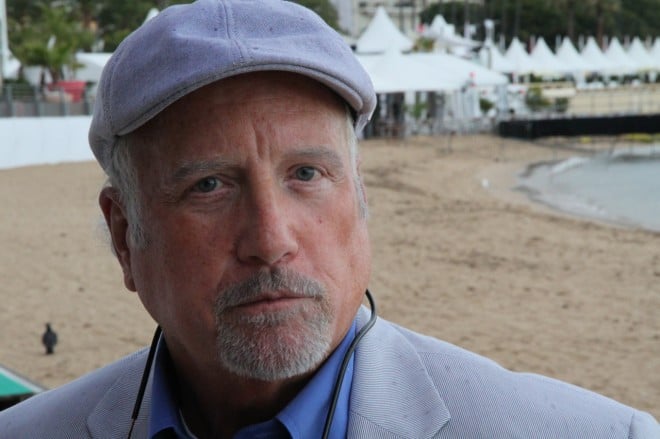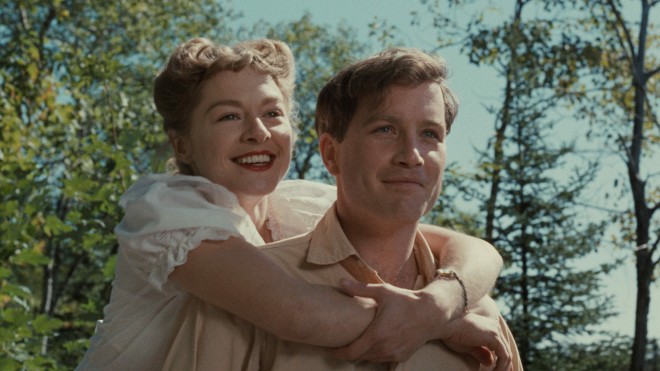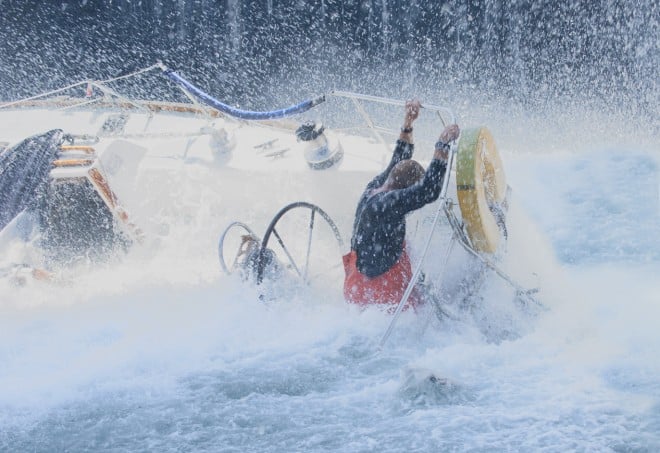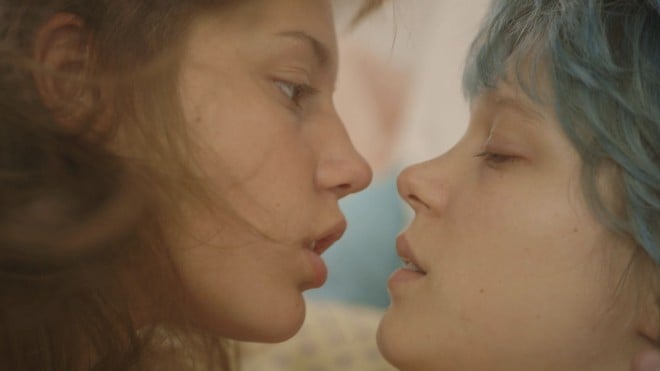Richard Dreyfuss owes ‘Jaws’ to Duddy Kravitz
After ‘Duddy,’ he feared he’d never work again, and begged Spielberg for the role
Share

In Cannes, jury president Steven Spielberg’s idea of a hotel is his own private mega-yacht, a $200-million, 284-foot vessel named Seven Seas, which is moored offshore. But he’s going to need a bigger boat if he wants to make room for Richard Dreyfuss, who is visiting Cannes for the first time since he was eight years old.
“I asked him if we could stay on the yacht,” Dreyfuss told me yesterday, at the Canadian pavilion on the beach. “At that moment I didn’t have hotel. He said he’s bringing the whole family so I can’t.”
“Maybe he just doesn’t want to be on a boat with you?” I ventured, only half-joking. “Did that ever occur to you?”
“No. He’s got a big family—seven kids. He was filling up all of the staterooms.”
Dreyfuss, 65, was a guest of the festival, along with Canadian director Ted Kotcheff, for last night’s Cannes Classics screening of a restored version of The Apprenticeship of Duddy Kravitz —Kotcheff’s 1974 film of the Mordecai Richler novel that gave Dreyfuss his first lead role. The brash young actor went on to star in three Spielberg movies: Jaws, Close Encounters of the Third Kind and Always.

Hot off the success of American Graffiti, Dreyfuss invested Duddy with a reckless ego and a hyena laugh, creating what is arguably the most bratty, irritating hero in the history of Canadian cinema. I watched the new version of the movie—which has been restored at the initiative of Helga Stephenson, CEO of the Canadian Academy of Film and Television—and it looks gorgeous. Everything is shot on location in and around Montreal, and the picture’s sense of authenticity has only ripened over the years, along with its value as time capsule of that singular Jewish enclave within Quebec’s anglophone minority. Richler wrote the script, which is smart and funny. The cast is superb, especially the radiant Micheline Lanctôt, who co-stars as Duddy’s long-suffering Québécoise girlfriend, but even though Duddy’s character is supposed to be an asshole, I found Dreyfuss’ acting so wildly over-the-top that it threw the picture off balance.
He wasn’t happy with it either, at least not when he first saw it. “I thought it was a wonderful movie,” said Dreyfuss, “but I didn’t like my performance, because I had no experience in watching me for that amount of time. I saw all the things I didn’t do. I didn’t’ see it as story-telling. It took me 20 years to really look at it and see it for what it was.”
But Dreyfuss may owe his career to Kotcheff’s movie. He says he had repeatedly turned down Spielberg’s offer to star in Jaws. “Then I saw Duddy and called Steven and begged for the part,” he explains. “Because I thought if that film got sold in America, I would never work again. I called [Spielberg] from New York and said, ‘Have you cast it?’ He said. ‘No.’ I said, ‘I’ll do it!’ ”
“But back then, Steven Spielberg wasn’t Steven Spielberg,” I said.
“Back then he really was,” countered Dreyfuss. “He was the uncrowned king. I was a prince in L.A. And I made myself a prince by turning down work. People didn’t do that. I also was a very good actor But Steven was signed to a contract before he was legally able to sign a contract—that’s how young he was. He directed Joan Crawford before he was 21 years old. One either survives the experience or doesn’t.” He adds that Spielberg quickly learned how to take charge. “If you walked on the set of Jaws, you never would have picked out Steven as the authority figure. If you walked on the set of Close Encounters, you would.
“The only time I ever bad-mouthed another actor to get a job,” Dreyfuss admits, “was Close Encounters, because that was originally written for Gene Hackman. I knew something about that part. And so I would walk by Steven’s office and say ‘Al Pacino’s crazy’ or ‘Dustin Hoffman’s neurotic.’ I finally got the part because I said ‘Steven, you need a child.’ He looked up and said, ‘You got the part.’ I knew he needed a man who had a child-like view. I told Steven once the name of the book I’ll never write is Steven, Have They Figured Out What I’m Looking up in Awe at.’ . . . (Sharks, aliens).”
But Dreyfuss was a man-child who majored in arrogance. “For a long time I was hired because I could take the edge off assholes,” he says. “That was one of the main reasons for my being hired for Duddy.” And at 26, he wasn’t shy about throwing his weight around. “I’d never heard of the book,” he says. “I got on a train, read the book and spent the rest of the time on the train writing ‘Add this, add this, add this,” because the novel was so rich.”
Dreyfuss has now brought his career full-circle back to Canada, starring as man dying of brain tumour in Jason Priestly’s bittersweet comedy Cass and Dylan. His co-star is the sensation Canadian actress Tatiana Maslani (Picture Day, Orchid Black), whose character joins him on a crazy road trip to Tofino. The movie will premiere in the fall.

Cannes, meanwhile, continues to provide surprises. Before discussing Spielberg’s yacht with Dreyfuss, I watch Robert Redford give a remarkable performance, with dialogue, as a sailor at sea fighting for his life on a capsized yacht on All Is Lost—a dramatic change of pace for Margin Call director J.C. Chandor. Taking place entire on the boat, and its life raft, it’s an intense, intimate action movie, and it’s probably safe to say no 76-year-old movie star has even given such a ruggedly physical performance. Expect Redford to get an Oscar nod.
His water-logged tour de force was sandwiched between ultra violence and graphic sex—respectively, Nicolas Winding Refn’s Only God Forgives, starring Ryan Gosling as the gormless thug managing a a Mauy Thai boxing club in Thailand, and Abdellatif Kechiche’s La Vie d’Adèle (Blue is the Warmest Color), an astonishing three-hour epic about a teenage girl’s headlong lesbian love affair that has the most rhapsodic and prolonged hard-core sapphic sex scenes I’ve ever encountered, yet with a level of acting and direction that make it a serious awards contender. Refn’s Oedipal vengeance saga is high-style auteur hooey—a lugubrious bore, despite lurching interludes of high camp (courtesy of Kristen Scott Thomas as a mother from hell) and gruesome samurai butchery. I loved Refn’s Drive. But the Danish director now seems to have Gosling under some kind of soporific spell. There’s nothing for his amazing actor to do in the movie but brood, as expressionless as a block of wood, and get beaten up. It almost makes me want to revise my praise of Drive in an act of critical vengeance.
